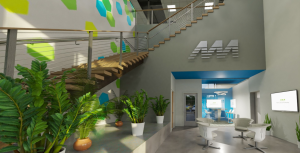 It was about one year ago today when employees from Metro Waste Authority stepped foot into the Waukee Innovation and Learning Center. Their hopes were to get some design ideas for their new recycling center, which did occur, but they also found a partnership opportunity with APEX’s Architecture and Engineering course.
It was about one year ago today when employees from Metro Waste Authority stepped foot into the Waukee Innovation and Learning Center. Their hopes were to get some design ideas for their new recycling center, which did occur, but they also found a partnership opportunity with APEX’s Architecture and Engineering course.
Recently, we had a chance to catch up with Sarah Borzo, Education and Outreach Coordinator at Metro Waste Authority, to gain a better understanding of the project work that has been ongoing throughout this school year. Here is what she had to say about her experiences working with Waukee APEX student associates from our Architecture and Engineering course.
The partnership between MWA and APEX really focuses on the design and educational offerings for the new Materials Recovery Facility (MRF). Can you provide some details as to what this facility will look like, and what Metro Waste Authority’s hopes are for this exciting addition to our community?
Sarah: The MRF is a $24 million dollar recycling facility that is located in Grimes. It is a state-of-the-art recycling facility with a large education center attached that will be opening in November of this year. The goal is to boost the efficiency of our recycling program, increase our recycling capacity, and provide education around recycling to improve recycling accuracy in our communities. We see the facility as a regional destination for recyclables and education.
Can you give a brief summary of the project work that took place last term, and how that project work has spanned into the spring semester?
Sarah: During the first semester, students focused on interior space utilization, landscaping, interior design, snack bar design, and technology integration. This group of students was instrumental in helping shape our furniture selection, the layout of the education space, finishes, and technology selection. They also launched important conversations about the overall visitor experience, including the idea of healthy, earth-friendly snack options for school-age visitors.
This semester’s students are focused on interactive exhibit design, outdoor exhibit design, land use, and stormwater mitigation. They are working to help us make the outside of the Materials Recovery Facility (MRF) as engaging and informative as the inside. The drainage mitigation team is tackling the engineering challenge of stormwater runoff and is looking for efficient, environmentally responsible, and attractive ways to turn a challenge into an opportunity.
How have you interacted with the APEX student associates this school year?
Sarah: To date, all interactions have taken place virtually, but we hope to incorporate site visits this semester.
Why is this project important to Metro Waste Authority, to our community, and to our aspiring professionals?
Sarah: MWA views this collaboration as being hugely important across the board. MWA benefits by hearing and seeing possibilities designed by creative young people who not only have a passion for this kind of design challenge but who also represent part of our target demographic. This enables us to keep a finger on the pulse of the perceptions and expectations of young adults who are able to speak and design to their preferences while still being close enough to memories of young childhood to design for that audience as well. Their input in this process will ultimately help us create a user experience at the MRF that will inspire better recycling practices, which will benefit not only our community but the world around us as well.
My deepest hope is that the associates benefit from engaging in a problem-solving process where their input is truly being heard and utilized. I also hope they experience the collaborative process, from working with each other to complete a cohesive design to working with me to provide options that help MWA’s goals and visions become reality.
In regards to this project, what has worked?
Sarah: I have been extraordinarily impressed with the student associates, both in terms of their work and their professionalism. The experience has been like working with professionals who are creative, innovative, and enthusiastic about their work. They have been insightful and inquisitive and have been highly responsive to our feedback. We discussed what “deliverables” they might be able to provide at the beginning of the experience, and what we received was beyond what we could have expected. Their work has truly helped shape our decision making.
The student associates learn incredible skills and use tools like Revit to create professional materials. I have been impressed this semester by the “student lead”, who facilitates all meetings and acts as the project manager. Again, this role has been masterfully performed and the experience mirrors the experience we have with professional architecture, engineering, and design groups. Our director and executive director were both very impressed with the presentations they were part of and are enthusiastic about maintaining our partnership with APEX.
What do you see in regards to future projects and partnerships with APEX? Any short and long-term goals that you are hoping to connect on?
Sarah: We will always look for opportunities to work with APEX associates on future projects. We have an extensive environmental learning area comprising hundreds of acres of natural area, an Environmental Learning Center in a converted farmhouse, and a beautiful old barn that we’d love to collaborate about with the associates.
